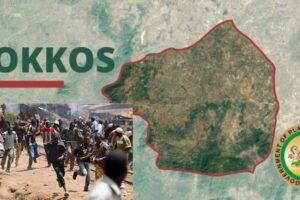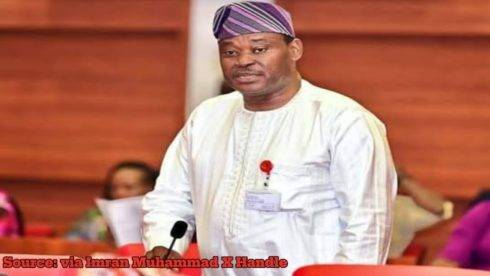Senator Jimoh Ibrahim, representing Ondo South, has urged the Federal Government of Nigeria to consider food vouchers as an effective tool to combat hunger and poverty. Speaking during a press conference in Washington, D.C., Jimoh Ibrahim highlighted the increasing rates of food insecurity and poverty in Nigeria. He suggested that food vouchers, distributed monthly to eligible citizens, could serve as a direct intervention to stabilize households affected by hunger.
Jimoh Ibrahim’s remarks were made in the presence of key figures, including Olayemi Cardoso, the Central Bank of Nigeria (CBN) governor, and Wale Edun, Nigeria’s Finance Minister. The senator called on the CBN and the Ministry of Finance to collaboratively launch this program, emphasizing the role of a harmonized policy to address these critical issues.
The Need for a Shift from Cash-Based Aid to Food Vouchers
According to Jimoh Ibrahim, transitioning from cash-based assistance to a voucher system could effectively address inflation and food insecurity. By substituting cash with vouchers, the government could help stabilize the economy by limiting cash flow and reducing inflationary pressure. Jimoh Ibrahim explained that food vouchers would directly target the basic needs of impoverished individuals, ensuring resources are directed toward essentials like food.
Food vouchers, he argued, could create a targeted impact, unlike some current palliative measures that have more indirect benefits. Jimoh Ibrahim urged the Federal Government to redirect its focus on essential goods, believing this approach would create a more immediate and tangible impact on struggling households across the nation.
Proposed Value of Food Vouchers and Target Demographics
Jimoh Ibrahim recommended a monthly voucher value of N100,000 for citizens above the age of 18 who face acute food insecurity and poverty. He outlined that, if implemented for a year, this program could significantly improve the quality of life for vulnerable Nigerians. This, he believes, would provide a consistent source of relief for families, ensuring that their monthly nutritional needs are met.
He further explained that a substantial, predictable support system could help alleviate poverty and hunger on a larger scale. By setting specific eligibility criteria, the program could prioritize those most affected, preventing the misuse of resources and ensuring that aid reaches those in dire need.
Collaboration Between CBN and Ministry of Finance Essential
To successfully implement the proposed food voucher program, Jimoh Ibrahim emphasized the importance of synergy between the Central Bank of Nigeria and the Ministry of Finance. He urged these institutions to align their policies to ensure the smooth execution of the program, which he believes would be a transformative step in addressing poverty. Such collaboration, he noted, would prevent policy discrepancies and enable the efficient distribution of resources.
He called for a “harmonized policy” between the CBN and the Finance Ministry, which would set a clear operational framework for the voucher system. With a unified approach, Ibrahim believes the government could address long-standing economic challenges by focusing on direct and immediate relief measures.
Potential Economic Benefits of Food Vouchers Over Cash Palliatives
Ibrahim believes that food vouchers would offer economic advantages over cash-based palliatives, which often lead to inflation due to the injection of additional currency into the economy. Food vouchers, on the other hand, limit inflationary pressures by targeting only food purchases, a necessity that is in high demand but less prone to price manipulation.
He argued that this program would act as a stabilizing force within the economy, as it would reduce the need for cash-based solutions that might inadvertently inflate other sectors. By channeling support through vouchers, the government could ensure that the assistance is used for basic sustenance, creating a more balanced economic outcome.
Preventing Social Crisis Through Food Security
In his address, Ibrahim warned that failing to address hunger and poverty could lead to social unrest. He cited that hunger and food insecurity are often precursors to social crises, especially in a country with a high rate of poverty. Ibrahim stressed that a proactive approach through a food voucher system could prevent potential conflicts stemming from food shortages and economic hardship.
He concluded by highlighting that when citizens’ fundamental needs are met, the government could foster a more stable and prosperous society. Ibrahim urged the government to recognize the urgency of this issue and implement the proposed solution to prevent social unrest and promote peace in Nigeria.
Table of Contents
Discover more from OGM News NG
Subscribe to get the latest posts sent to your email.














